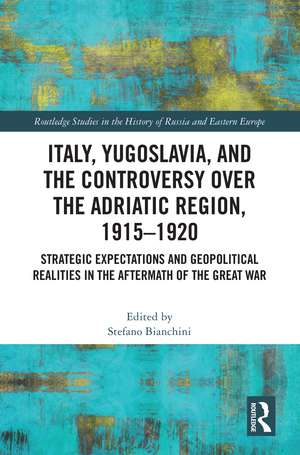Italy, Yugoslavia, and the Controversy over the Adriatic Region, 1915-1920: Strategic Expectations and Geopolitical Realities in the Aftermath of the Great War: Routledge Studies in the History of Russia and Eastern Europe
Editat de Stefano Bianchinien Limba Engleză Hardback – 16 aug 2024
Based on vast archival documentation and published sources, the contributors to this book discuss the nature of the disputes which arose in the Adriatic area, often as the result of the inhabitants of the different territories being of several nationalities, and examine how the disputes were concluded. The book charts the disappointments of both Italians and Yugoslavs, the Italians disappointed that the terms of the Treaty of London of 1915, which promised Dalmatia to Italy in return for Italy entering the war against the Austro-Hungarian Empire, were not fulfilled. The Yugoslavs were disappointed loosing territories containing large Yugoslav populations. The volume considers public opinion, the words, positions and actions of leading politicians, and the continuing consequences of the settlement, many of them adverse consequences for particular cities and localities.
Presenting a comprehensive approach to the Adriatic controversy, this book will be of interest to those studying European history of international relations, diplomatic negotiations and nationalism, modern history, Central Asian, Eastern European and Russian Studies.
Din seria Routledge Studies in the History of Russia and Eastern Europe
- 15%
 Preț: 403.76 lei
Preț: 403.76 lei -
 Preț: 325.11 lei
Preț: 325.11 lei - 9%
 Preț: 1003.63 lei
Preț: 1003.63 lei -
 Preț: 284.52 lei
Preț: 284.52 lei - 14%
 Preț: 315.08 lei
Preț: 315.08 lei - 18%
 Preț: 1057.40 lei
Preț: 1057.40 lei -
 Preț: 427.12 lei
Preț: 427.12 lei - 14%
 Preț: 325.34 lei
Preț: 325.34 lei - 18%
 Preț: 273.05 lei
Preț: 273.05 lei - 18%
 Preț: 1279.68 lei
Preț: 1279.68 lei -
 Preț: 379.71 lei
Preț: 379.71 lei -
 Preț: 383.33 lei
Preț: 383.33 lei - 16%
 Preț: 325.34 lei
Preț: 325.34 lei - 18%
 Preț: 1056.28 lei
Preț: 1056.28 lei - 16%
 Preț: 274.06 lei
Preț: 274.06 lei - 18%
 Preț: 999.97 lei
Preț: 999.97 lei - 18%
 Preț: 1276.34 lei
Preț: 1276.34 lei - 18%
 Preț: 1000.27 lei
Preț: 1000.27 lei - 18%
 Preț: 1060.87 lei
Preț: 1060.87 lei -
 Preț: 463.58 lei
Preț: 463.58 lei - 14%
 Preț: 302.36 lei
Preț: 302.36 lei -
 Preț: 444.62 lei
Preț: 444.62 lei -
 Preț: 469.34 lei
Preț: 469.34 lei - 14%
 Preț: 301.13 lei
Preț: 301.13 lei -
 Preț: 416.22 lei
Preț: 416.22 lei -
 Preț: 462.81 lei
Preț: 462.81 lei - 14%
 Preț: 312.43 lei
Preț: 312.43 lei - 18%
 Preț: 1163.63 lei
Preț: 1163.63 lei -
 Preț: 442.50 lei
Preț: 442.50 lei - 26%
 Preț: 875.55 lei
Preț: 875.55 lei - 18%
 Preț: 1116.38 lei
Preț: 1116.38 lei - 18%
 Preț: 1107.75 lei
Preț: 1107.75 lei -
 Preț: 436.14 lei
Preț: 436.14 lei - 18%
 Preț: 1273.35 lei
Preț: 1273.35 lei
Preț: 1115.51 lei
Preț vechi: 1360.38 lei
-18% Nou
Puncte Express: 1673
Preț estimativ în valută:
213.52€ • 232.01$ • 179.47£
213.52€ • 232.01$ • 179.47£
Carte tipărită la comandă
Livrare economică 21 aprilie-05 mai
Preluare comenzi: 021 569.72.76
Specificații
ISBN-13: 9781032819068
ISBN-10: 1032819065
Pagini: 326
Dimensiuni: 156 x 234 mm
Greutate: 0.64 kg
Ediția:1
Editura: Taylor & Francis
Colecția Routledge
Seria Routledge Studies in the History of Russia and Eastern Europe
Locul publicării:Oxford, United Kingdom
ISBN-10: 1032819065
Pagini: 326
Dimensiuni: 156 x 234 mm
Greutate: 0.64 kg
Ediția:1
Editura: Taylor & Francis
Colecția Routledge
Seria Routledge Studies in the History of Russia and Eastern Europe
Locul publicării:Oxford, United Kingdom
Public țintă
AcademicNotă biografică
Stefano Bianchini is a retired Professor of History and Politics of Eastern Europe, University of Bologna-Forlì Campus, Italy.
Cuprins
List of contributors; List of archives with acronyms; Maps. At the origins of the Adriatic controversy: An introduction Part I. The Adriatic question a century later: Reassessing geopolitical expectations and diplomatic realities Chapter 1. Power politics, territory or nationality? From the Peace Conference to the Treaty of Rapallo; Chapter 2. The Slovenes and the controversy over borders with Italy and Austria after the First World War; Chapter 3. The “Fiume enterprise” and the D’Annunzio Legionaries in the Italian Army Documents: The Gen. Pecori Giraldi report (1920); Chapter 4. The impact of the Treaty of Rapallo on Hungarian diplomacy; Chapter 5. The Adriatic question, The Rapallo Settlement, and the end of Montenegrin independence; Chapter 6. Disputed Albania in the diplomatic negotiation of the Treaty of Rapallo Part II. The Adratic question: Intellectuals and public opinion debates Chapter 7. Tomáš G. Masaryk, H. Wickham Steed, Woodrow Wilson And The “Adriatic’s” Italy; Chapter 8. Gaetano Salvemini and the Adriatic question from the First World War to the Treaty of Rapallo; Chapter 9. "Soldier of my people": Ante Trumbić and the Adriatic question; Chapter 10. Francesco Salata and the foreign policy of liberal Italy (1919–1920); Chapter 11. The war, Fiume and Rapallo in the literary memory; Chapter 12. The American public opinion on the Adriatic question; Index
Descriere
This book explores the path that led to the Treaty of Rapallo (1920) in the aftermath of the First World War. It will be of interest to those studying European history of international relations, diplomatic negotiations and nationalism, modern history, Central Asian, Eastern European and Russian Studies.
